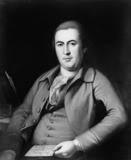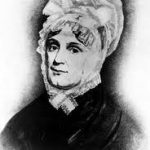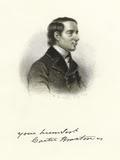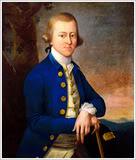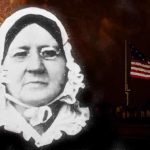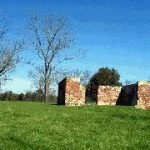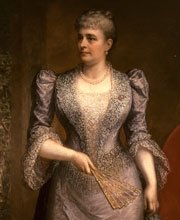Wife of Declaration of Independence Signer Benjamin Harrison
Elizabeth Bassett was born on December 13, 1730, at Eltham, the family estate in New Kent County, Virginia. She was the daughter of William Bassett and a niece of Martha Washington. Elizabeth’s great-grandfather, William Bassett, came to America from Newport on the Isle of Wight and settled in Blissland in New Kent County, Virginia, where he died in 1671.
Benjamin Harrison V
Charles Willson Peale, Artist
National Portrait Gallery
Smithsonian Institution
Benjamin Harrison V was born on April 5, 1726, at Berkeley Plantation, the family estate in Charles City County, Virginia, which is beautifully situated on the banks of the James River overlooking Petersburg and Richmond. He was the eldest son of ten children born to Benjamin Harrison IV and Anne Carter Harrison, one of the most prominent planter families in the South; he was the fifth in a line of politicians bearing the same name.
Benjamin’s father, Benjamin Harrison IV, was a member of the House of Burgesses from 1736 to 1744, and was Sheriff of Charles City. Harrison IV built Berkeley mansion in 1726 with brick fired on the plantation. His initials and those of his wife Ann appear in a datestone over a side door. It was built
Benjamin’s mother, Anne Carter Harrison, was the daughter of Robert “King” Carter, whose family, like the Harrisons, was a force in Virginia and national politics. He served for many years as treasurer of the Colony and member of the King’s Council, and was a wealthy and influential member of the Virginia aristocracy and owned over 300,000 acres and a thousand slaves.
Benjamin V was a student in the College of William and Mary when his father and two sisters were killed by lightning during a thunderstorm at Berkeley on July 12, 1745. At age 19, he returned home and took over the management of Berkeley’s 1,000 acre operations, including ship building and horse breeding. Although he was considered young to be entrusted with such duties, he displayed good judgment in his responsibilities. In time, Harrison’s landholdings grew to include eight plantations and other properties.
In 1748, Benjamin Harrison V married Elizabeth Bassett, his second cousin, and settled at Berkeley Plantation. They would have seven children. Their son, William Henry Harrison, would become the ninth president of the United States in 1840; their grandson, Benjamin Harrison, would be elected as the twenty-third president of the United States in 1888.
Benjamin Harrison’s public service began in the Virginia House of Burgesses in 1749, where he continuously held a seat until 1775, sometimes as Speaker. During this time, his power and influence caught the attention of the royal governor, who tried unsuccessfully to recruit him for a seat on the executive council, but Harrison identified more with the peoples’ rights.
He was chosen in 1773 as one of the Committee of Correspondence that united the colonies against Britain. Between 1773 and 1776, he shared in the tasks of the Revolutionary Conventions and the Provincial Congresses.
In 1774, the Virginia patriot was elected as a delegate to the First Continental Congress and was there on opening day, September 5, 1774. He shared a house in Philadelphia with his Virginia cousins, George Washington and Peyton Randolph. Harrison was highly regarded in Congress, where he continued to serve until 1778.
Although usually silent on the floor, Harrison made valuable contributions on the foreign affairs, marine, military, and financial committees. He was one of a party of representatives who met with General Washington in 1775 to plan the future of the American Army. He was also present during the deliberations on the settlement of commercial restrictions against Britain, the state of the colonies, the regulation of trade, and during the debates concerning independence.
On June 7, 1776, Harrison was chosen to introduce fellow Virginian, Richard Henry Lee, who presented a resolution calling for independence from England. Harrison was selected to read Thomas Jefferson‘s draft of the Declaration of Independence to the assembled delegates on July 1, and served as Chairman of the Whole during the debate over independence on July 2. Benjamin Harrison was 50 years old when he signed the Declaration of Independence.
![]()
Benjamin Harrison Signature
On the Declaration of Independence
Benjamin Harrison was a very large man, standing six feet four inches tall and weighing 240 pounds. He once picked up the much smaller John Hancock and set him on the Congress President’s chair and said, “We will show Mother Britain how little we care for her by making a Massachusetts man our president.”
Harrison was witty and jovial, with a wry, often black sense of humor that delighted his fellow congressmen. When there was discussion about the possibility of being hanged by the British for signing the Declaration of Independence, Harrison was reported to have said to Elbridge Gerry, a very thin man, “I shall have all the advantage over you. It will be all over in a minute for me, but you will be kicking in the air half an hour after I am gone.”
While in Congress, Harrison helped establish the three major governmental departments of War, the Navy, and the State Department. He also chaired the deliberations concerning the proposed Articles of Confederation, and solicited financial and other assistance from other countries as a member of the Secret Correspondence Committee.
In 1778, Harrison returned home and entered the lower house of the Virginia Legislature, where he presided as speaker in the years 1778-81. He also served as a lieutenant in the county militia.
Berkeley Plantation, located between Richmond and Williamsburg, has left its own mark on history. Berkeley served as General George McClellan’s headquarters in his failed attempt to take Richmond for the Union during the Civil War.
In late 1780, American traitor and British General Benedict Arnold, at the head of a British invasion force, landed on the shores of the James River and began ravaging the homes nearby. Berkeley was plundered by soldiers, and Arnold ordered the ancestral portraits of the Harrisons thrown into a bonfire. Harrison had to flee to the interior of Virginia to avoid being captured by the British Army.

Berkeley Plantation
Benjamin Harrison V lived all his life at Berkeley Plantation, one of Virginia’s earliest Georgian-style plantation homes. Berkeley became the focus of colonial Virginia’s economic, cultural and social life. The plantation passed to Benjamin Harrison V, and then to Benjamin Harrison VI.
When his second cousin, Thomas Nelson, Jr. resigned from the governorship in 1781, Harrison was elected Governor of Virginia and was twice re-elected to that office. His three terms as Governor reflected the ascendancy in Virginia of the conservatives, who including Carter Braxton, Patrick Henry, and Richard Henry Lee.
In 1785, at the end of his third term as governor, Harrison returned to private life, carrying with him the esteem of his fellow citizens. He rejoined the legislature (1784-91), and served as speaker part of the time.
In 1788, when the new constitution of the United States was submitted to Virginia, he was elected a member of the state convention. Because of his advanced years and increasing attacks of gout, he did not take a very active part in the debates of the convention, but he argued strenuously for a statement of personal rights prior to ratification. Failing that, he voted in favor and helped secure Virginia’s ratification in a close vote. He sat on the committee that recommended a list of rights to be included in what became the Bill of Rights.
In the spring of 1791, Harrison suffered a severe attack of gout, and he partially recovered. In April, he was again elected a member of his state legislature. On the day after his election, following a festive party, he was stricken with gout.
Benjamin Harrison V died on April 24, 1791, at Berkeley Plantation, Charles City County, VA, at the age of 65. He was buried there in the family cemetery.
Elizabeth Bassett Harrison died in 1792 at Berkeley and is buried beside her husband.
The Benjamin Harrison Memorial Bridge is a vertical-lift bridge that spans the James River between Jordan’s Point in Prince George County and Charles City County near Hopewell, Virginia.
SOURCES
Benjamin Harrison V
Principles of Freedom
Benjamin Harrison 1726-1791
Benjamin Harrison Biography
